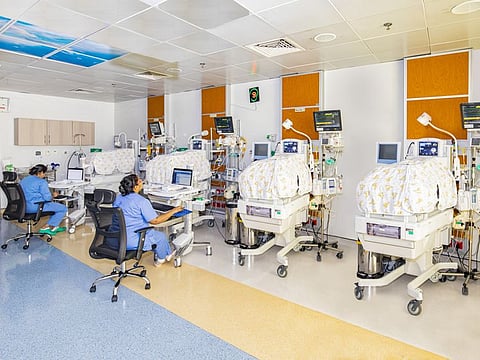Ajman woman gives birth to quadrapulets
Both mum and her four newborns are in good health

Ajman
An Arab woman from Ajman is in the news after giving birth to a set of quadrapulets at Khalifa Medical City in the emirate.
The babies included three girls and a boy who weighed between 1,300 and 1,500 grams.
The mother and children are reportedly in good health.
Dr Rijeka Bornheidi, specialist surgeon and consultant obstetrician and gyneacologist, said the woman gave birth to the foursome through a successful caesarean section,
She said the newborns and are expected to stay in the hospital for a few weeks, noting that the birth was cesarean. The delivery took place in the woman’s 31st week of gestation. She pointed out that the hospital treats twin as high-risk deliveries as there is a likelihood ofr complications occcurring during childbirth, including blood sugar spikes, premature arrival and early placental separation. However, the delivery of the current set of quadrapulets was without complications.
Dr Bornhridi said the expertise and professionalism of the medical team who did the C- section helped ensure it was a smooth affair.
The father of the babies expressed happiness at the new arrivals. saying they were a blessing from the Almighty. He said at one stage, he was worried about the health of the mother and the newborns, but good medical attention ensured they were all keeping well.
Rare occurence
Quadruplets are rarer than twins or triplets. There are only a few thousand sets recorded worldwide. But thanks gto fertility treatments, quadruplet births are becoming more common. Quadruplets can be fraternal (multizygotic), identical (monozygotic) or a combination of both. Multizygotic quadruplets occur from four unique egg/sperm combinations while monozygotic multiples are the result of a fertilised egg that splits into two or more embryos. It is possible for a split to occur more than once, producing monozygotic quadruplets. Fully monozygotic quadruplets are considered rare, representing only one in about 13 million pregnancies.



